REACHER Reviews: Welcome to Margrave – A Review of Police Procedure and Forensics, Part Two
When Jack Reacher stepped into our living room several days ago I knew I wanted needed to bring REACHER to this blog, and to you. There are many intricate details in the show that mirror real police officers and how they carry themselves. I’ll highlight those characteristics. I’ll also point out the things that aren’t quite realistic to help you, the writer, avoid making similar errors in your books.
Before I begin with the the second part of the review of episode one, Welcome to Margrave, I’d like to once again mention that I discussed this endeavor with Lee Child, Reacher’s creator, to make certain I had his blessing to review the show. He gave his approval without hesitation.
So, without further ado and with a hearty thanks to Lee Child, off we go. But first a disclaimer – HERE’S YOUR SPOILER ALERT!
NOTE – Part One of Welcome to Margrave was an introduction of the main characters in season one and how well the actors played the part of law enforcement officers. Part Two is an examination of the law enforcement procedure and forensics used in the episode. In addition, I’ve included a few details of interest. Welcome to Margrave is the only two-part review. After Part Two (today) I’ll post an episode review on Friday of each week.
Please keep in mind that REACHER is a television show that has less than one hour to tell a complete story and deliver nail-biting action and a bit of romance, introduce characters and setting, stimulate the emotions of viewers and, well, you get the idea. Obviously, in order to achieve the goal of having viewers want to want the show certain liberties with facts must be taken to hold our interest.
Reacher and Blind Blake
This review can’t begin without mentioning the purpose of Reacher’s visit to Margrave, his love of music, especially the blues. During his initial interview with Detective Finlay, Reacher said he caught a bus in Tampa the previous night, traveled over 500 miles, and when the bus reached the road to Margrave he asked the driver for the favor of making an unscheduled stop to let him off.
Finlay asked why the choice to exit the bus on the main road to then walk 14 miles to Margrave.
Reacher responded, “On account of Blind Blake.”
Reacher’s answer clearly irritated Finlay. “Okay, who’s that?” he said, adding a bit of dramatic tough-guy rasp to his typically smooth but authoritative voice. For emphasis he combined the gruff tone with a slightly priggish side-to-side “oh-no-you-didn’t-go-there” head shake. Typical cop behavior.
“Blues singer,” Reacher said. “Legend has it he died in Margrave a long time ago. I figured I’d learn a bit about him.” A beat passed, then he nodded his head a couple of times and added, “I like music.”
Arthur “Blind” Blake was indeed a real person who is often referred to as ‘King of the Ragtime Guitar.’ His idiosyncratic playing style was quite complex and unique. For many years it was believed that Blake was born in Florida. However, in 2011 discovered documents proved he was born in 1896, in Newport News, Va.
Blake’s talent took him on the road playing music in southern states, including on the streets of Jacksonville, Florida. But he eventually migrated to Ohio and then Chicago where, in 1926, he landed a recording deal with Paramount Records. Paramount eventually moved their studios to Milwaukee, Wi. where Blake recorded with them until 1932. Blind Blake died in Milwaukee on Dec. 1, 1934.
A bit of fun trivia – Lee Child is blues fan. So much so that he collaborated with performing songwriter team Jen and Scott Smith, and their band Naked Blue, on the Jack Reacher inspired album “Just The Clothes On My Back.” Click here to listen to their song “Killing Floor.” As you know, “Killing Floor” is the book the first season of the REACHER television series is based upon.
Child’s music interests vary and includes country music. A few years back, while at the Writers’ Police Academy, Lee bid an extremely generous amount of money to win, at auction, a guitar signed by country stars Lady Antebellum (now Lady A), Keith Urban, Brad Paisley, Vince Gill, and The Oak Ridge Boys.
Now, for the police procedure and forensics in Welcome to Margrave
The Diner – Reacher is seated in a corner booth, about to enjoy a forkful of what is, according to the server, “the best peach pie you ‘gone find in Georgia.” Two officers drive up to the diner with red and blue lights winking and blinking and flashing, and sirens blaring. One parks near the front the door, gets out and racks a shell into the chamber of a shotgun, all while staring at Reacher through the front plate glass window of the restaurant. The second officer fishtails his patrol car into the gravel lot like a Nascar driver after “trading paint” at the Daytona 500. Needless to say, the officers came in hot, which is not a great tactical move if you want to sneak up on a dangerous criminal, or to avoid a potential hostage situation.
The phrase ‘trading paint’ is a colloquialism for the event when 2 racing automobiles bump against one another often causing the paint from each vehicle to be transposed onto the other. – Wikipedia
Reacher sensed the highly-strung and intense officers were coming for him. His acute and highly-developed situational awareness went to work telling him to immediately scan the diner—a happy couple seated in a booth at the front window directly in front of him, their server, two playful young boys at the counter, the cook, and the woman who’d brought Reacher the slice of peach pie and coffee. Had he been the desperate murderer the cops anticipated, he’d had his pick of hostages.
It was obvious, though, that Reacher, not a killer, was concerned for the safety of the employees and diners, and that any sudden moves by him could result in innocent people being harmed. So Reacher calmly placed his hands, palms down on the table, and waited for the nerves-on-edge-officers to do exactly as he expected, rush inside with emotions high and loaded guns drawn and pointed at him. Both had a clear case of adrenaline-induced tunnel vision and were focused solely on Reacher, a very large and muscular man who they believed had brutally murdered a man just a few hours ago. The officers were so clearly fixated on Reacher that the safety of the others did not enter their minds. Not good police procedure, but this is important for writers to know because tunnel vision is a very real problem for officers who’re involved in high-stress, possible life-threatening situations. The scene was great, and provided tons of details about the two officers that would play out later in the series.
- Both officers held their index fingers outside the trigger guards. This is proper procedure to avoid accidental discharges.
- Not evacuating the diners and staff before having Reacher exit the booth and stand was not tactically sound. If Reacher had been an armed bad guy intent on shooting it out with police chances were great that innocent people could have been wounded or killed. Again, this was a great inside look at the mindset of the two officers, and their backstory (little experience and lack of ongoing training, which could be an issue in the real world).
This scene alone added several important and vivid layers to the setting and characters. This was the moment that showed us what to expect in the town of Margrave. It was as eye-opening as the scene in the Wizard of Oz when the movie switched from black and white to color. It also spoke quite loudly about Reacher—stoic, serene, cool under pressure, and naturally intimidating.
The Police Station – The plaques, awards, and certificates hanging on the lobby wall, along with official department photos of the five Margrave PD employees—chief, three officers, and detective—was nice attention to detail. It’s quite possible you’d see this sort of thing in small town departments. Another popular wallhanging seen in police agencies is a framed collection of patches collected from departments from around the world.
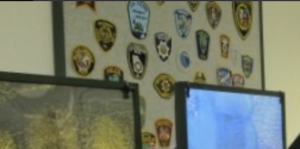
During Finlay’s interview with Reacher he said, “I was informed you were read your rights, so you know you don’t have to answer.” Wisely, Reacher maintained silence.
In the real world where actors aren’t limited to brief scenes to conduct police business, Finlay would’ve again informed Reacher of his rights according to Miranda and had him acknowledge that he understood those rights. This is something that should be done any time there’s a break between significant periods of questioning and/or when a different officer begins a new interview session.
Again, Finlay is an actor who had mere seconds to get through the scene. The show is not an instructional guide for police officers, but this is something crime writers should know.
MIRANDA FACTS
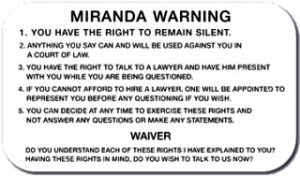
- Officers should repeat the Miranda warnings during each period of questioning. For example, during questioning officers decide to take a break for the night. They come back the next day to try again. They must advise the suspect of his rights again before resuming the questioning.
- If an officer takes over questioning for another officer, she should repeat the warnings before asking her questions.
- If a suspect asks for an attorney, officers may not ask any questions.
- If a suspect agrees to answer questions, but decides to stop during the session and asks for an attorney, officers must stop the questioning.
- Suspects who are under the influence of alcohol or drugs should not be questioned. Also, anyone who exhibits signs of withdrawal symptoms should not be questioned.
- Officers should not question people who are seriously injured or ill.
- People who are extremely upset or hysterical should not be questioned.
- Officers may not threaten or make promises to elicit a confession.
Subsonic Bullets – A sticking point for avid shooters, I’m sure, was when Reacher told Finlay the shooter was someone who knows firearms well, and that the bullets were small caliber, 9mm 95 grain. “That’s subsonic,” Reacher said. “A silencer was used. He also knew enough to pick up his brass.”
The difference between subsonic and supersonic rounds is that subsonic ammunition travels slower than the speed of sound (1,100fps); therefore, it won’t break the sound barrier which produces the sonic crack most people associate with traditional supersonic gunfire. Supersonic bullets travel faster than the speed of sound.
Loading a 9mm round as subsonic with a lighter 95 gr. bullet could cause the firearm’s action/slide to not cycle, essentially allowing the pistol to fire only once without manually cycling another round into the chamber. Even 115 gr. rounds have been known to cause cycling problems.
FYI – Back in the day, I loaded my SIG Sauer (duty weapon) with subsonic 9mm 147gr. Hydra Shot Plus P ammo.
Perp – Reacher, to Finlay, after Reacher was released from the holding cell. “Outside. Uncuffed. Treating me like a person instead of a perp?”
Not many police officers use the shortened form of the word perpetrator. Instead, they use the more common terms, suspect, actor, or ***hole. Listen to police scanners and you’ll rarely, if ever, hear an officer say, “We apprehended the perp at 0100 hours.” Typically, it’s, “We apprehended the suspect/subject at 0100 hours.”
Perp is generally a specific, regional term. I’ve heard it used more in the New York and Boston areas more than any other location, especially the south. Still, it’s not used by all officers. TV and film writers use it without shame.
FYI – the term perpetrator is NOT to be confused with the closely-sounding “percolator.” Confusing the two could prove to be quite embarrassing.
Yes, I once saw the perpetrator/percolator faux pas in a manuscript. Imagine reading a book written by your favorite author and you see this on page 47 – “10-4, Captain, the percolator who robbed the hot dog stand was bald, short, and stocky.
By the way, you’ll probably not hear the other, more colorful term “a**hole” used on the police radio. It and other profanity are not supposed to be spoken on the air, but when the adrenaline is high and the bullets are flying, well, you just might hear anything.
“The a**hole just fired two rounds at me! Send &*%@ing backup. NOW!!”
Reacher in prison – The local PD doesn’t have an onsite holding cell designed for housing prisoners overnight, so the decision was made to ship Reacher and Paul Hubble, a person who falsely confessed to killing the same person police accused Reacher of slaying, are hauled, by bus, to the local prison to spend the weekend. The villain’s plan (yes, this story has a villain) was to have a group of prisoner “take care” of Reacher and Hubble. Hubble, by the way, was forced to help the villain and his ring of bad guy henchmen with their financial scheme. The bad guys promised to torture and kill Hubble and his family if he didn’t do as they demanded. The plan to “take care” of tReacher and Hubble, thanks to Reacher, didn’t go as planned, though. More on this in a moment.
Back to the bus ride to prison – The complete occupancy of the bus included Reacher, Hubble, and the bus driver. Reacher and Hubble were cuffed to a chain attached to the seat-back in front of them. An actual transport to prison, though, involves a bit more security than a lone bus driver with prisoners accused of murder seated behind them. Often, there’s an armed officer stationed in a secure cage at the rear of the bus, and an unarmed officer, or two, in the front. However it’s done, it’s never just a bus driver and prisoners. But this is a TV show and extras cost dollars.
When the bus arrived at the prison, the driver drove it into the sally port. He stopped the bus, opened the door, and Reacher stepped outside followed by Hubble. Officer Spivey, a scrawny corrections officer, met the two prisoners as they exited the bus. It was he who booked the two men and assigned them their prison clothing, and it was he who ordered the men to strip to allow him to search for contraband.
Reacher refused the strip search, saying blanket searches are unconstitutional. However, since Reacher and Hubble were both arrested for murder, a violent crime, they, in the real world, would be required too submit to a strip search. Safety and security is a priority.
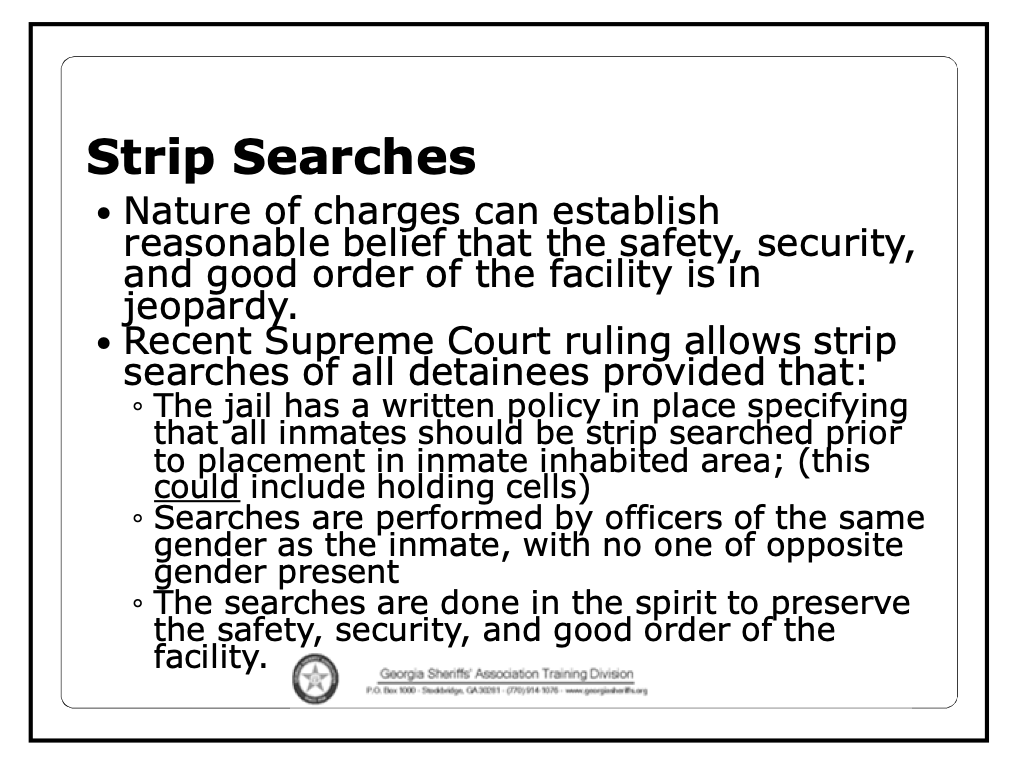
Sourse – Georgia Sheriff’s Association
Prison fights – Yes, inmates do indeed size up the newcomers, and those who are a bit timid and of slight stature often don’t fare very well unless, of course, they can prove themselves valuable in some way other than serving physical wants and needs. Or, unless they have a Hulk-like friend who’s capable of bashing the faces of the top dog, the shot caller, and his entourage. Reacher, Hubble’s Hulk-like cellie aptly handles the first inmate who came calling for Hubble. Good fight scene. Brief, but good.
Next, the shower/restroom fight scene where Reacher finds himself surrounded by five burly inmates who are there to, as they’d say in the south, “stomp a mud hole in his a**.” One of the five is armed with a shank.
Reacher, calm and cool as always, said, “If you boys knew what’s about to happen to you, you’d leave now. So I’ll give you to the count of three. One—”
Using the tactical advantage of skipping the anticipated numbers two and three, Reacher took out four of the hitmen and then used his thumb to gouge an eye of the fifth, the guy with the shank. This is a fight scene that would do any crime fiction novel proud. Despite the fights being choreographed, the tactics used were sound.
The Eye Gouge
The rest of the show
- When Reacher and Hubble are released from prison after the failed attempt to kill them, Roscoe is waiting outside to offer Reacher a ride. She takes him from the prison to a thrift store to purchase “new” clothes. She again asks why he decided to visit Margrave.
“‘Im here because of Blind Blake, but actually it’s on account of Chauncey.”
“Who’s Chauncey?”
“A couple days ago,” Reacher said, “I go to Chauncey’s Bar & Grill in Tampa. Guy there was playing “Police Dog Blues” by Blind Blake. I remembered a conversation I had with my brother Joe a while back. Read some article about Blake, said he played his last show in Margrave, and that’s where he died. So I got on a bus.”
- Reacher’s pension is wired to him each month via Western Union.
- Reacher heard the sound of Mississippi Fred McDowell ‘s blues music coming from inside Mr. Mosley’s barber shop, so he went inside for a shave. The two men chat about the legend of Blind Blake and then the conversation shifts to the Kilner family, the
peoplevillains who control the town. - Reacher walks to the police station where he learns a second body has been found, forty yards from the first. The victim was shot in the back of the head.
- Reacher travels to the morgue with Finlay and Roscoe where he learns the victim is his brother, Joe.
A few minutes later, Reacher and Finlay exchange a few heated words. Roscoe intervenes before things get out of hand. Reacher, though, seems determined to punch Finlay into next week. And, despite the tremendous size difference and that one of Reacher’s upper arms is the size of Finlay’s waist, Finlay doesn’t back down. This is a characteristic seen in most real life cops. They don’t shy away from anyone when it comes to taking a suspect to jail. It’s part of the job and they’ll worry about the bruises another time.
Finlay is the real deal.
Roscoe pointed to Finlay’s unmarked police car and said, “Okay, this isn’t gonna happen. Reacher, sit in the back. Hey. I know you’re not the kind of guy to beat up on somebody half your size without good reason.”
He’s giving me a reason,” said Reacher.
“Yeah? Well, I know people.,” said Roscoe. “And you’ve got kind eyes. Do what I say, Reacher. Please.”
The trio are next seen traveling through the countryside. They’re quiet and Reacher is staring out the window.
Roscoe said, “You okay, Reacher?”
Reacher replied, “Just thinking maybe my brother told me about Blind Blake for a reason. Thinking about him lying in that morgue. Thinking I’m supposed to do something about it.”
“Like what?” said Finlay.
“I guess I’ll find everybody responsible. And kill every last one of them.”
The scene switched to …

… and then faded away to the music of the Rolling Stones’ “Can’t You Hear Me Knocking.”
NOTE – This review and the others that follow in the coming weeks are solely for the purpose of pointing out proper police procedure and forensics, and the inaccuracies, if any of either. Again, this is to help writers learn what real and what’s not. Yes, I know it’s a TV show and not a documentary or police training film.
As always, keep in mind that TV is visual and certain liberties must be taken to capture and hold the attention of viewers within the brief timespan of a single episode. Authors, on the other hand, must activate a readers senses and take their fans on a journey using nothing more than written words. TV audiences tend to be more forgiving when characters perform actions that aren’t quite believable than are readers of books.
Since readers move through a story at a much slower pace than viewers of TV and film, they have far more time to detect and analyze things that aren’t quite accurate. Therefore, the need for an explanation, even one that’s totally fabricated in the author’s mind, about why the neighbor’s recliner has the ability to travel through time is more important than merely seeing it happen on TV. We’re used to seeing wacky, nonsensical stuff on television, but not in books without reading an explanation as to why something happened (My neighbor invented a way to have fruit trees grow upside side so people can pick apples, peaches, and cherries without having to use a ladder. The only drawback is that over ripe fruit now falls up, instead of down. As a result, gravity is a bit wonky, but Newton says we’ll adapt).
That’s all it takes to convince your readers, a reason to believe.


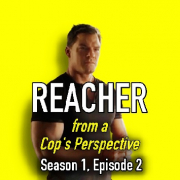
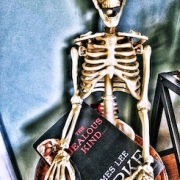
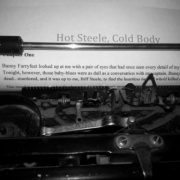


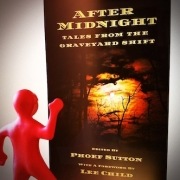
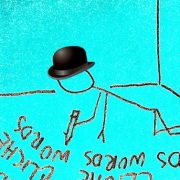
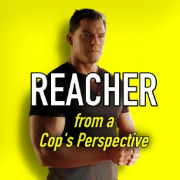



Another great review. I always learn something from your blog. No matter the subject, I learn something. Thank you for all you do!
Thanks, Everyone. The series is great, I think. REACHER has been renewed for a season two, Morgan, and filming will start later in the year.
Always glad to hear your insights on proper police procedure. I’ve moved further along on Reacher and wish there were already going to be more episodes that the one seaason. Binge watching can get a person spoiled!
Great post Lee. You’re are always a fascinating read, your posts are full of information and help.
Good stuff, Lee. Thanks